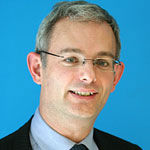
It’s another rainy Monday in Manchester when I head to Oldham to visit Trinity Mirror’s offices to find out more about the remarkable success of its data unit.
Entering the newsroom, that produces the Manchester Evening News and associated weeklies, it feels like a quiet news day. It’s mid-afternoon and presumably any banter about the previous day’s dramatic Manchester derby will have fizzled out long ago and attention is now firmly focused on the next day’s agenda for a few huddles around the newsdesk.
Near the end of this room, past a swathe of empty desks, sit David Ottewell, head of the data unit and five of his eleven staff with others based in Cardiff and Bristol.
At 4pm every day, a conference call brings them together to discuss their various projects and the datasets being published each week by government departments and other bodies. And it is out of this meeting that the next day’s powerful front page for the MEN is born. Claire Miller, deputy head of the unit, has figures to show a huge increase in violent crime in Manchester alongside a sharp drop in police numbers.
It flies in the face of claims from ministers that the two things are not related and the stats are picked up by the newsdesk who develop the story, adding local quotes and context. It’s a process being played out in Trinity Mirror newsrooms around the country as Miller is able to provide multiple versions of the basic story which plays out strongly in Leicester, Teesside, Liverpool and elsewhere – proving that big national stories are often made up of lots of big local stories.
The conference call also shows the diversity of topics handled by the team which on this day ranged from the number of cyclists injured or killed by car doors being flung open to proving which was the worst ever team in British football (Cambridge United in 1985, apparently).
There’s also an interesting story developing about how different regions of the NHS are slashing spending on anti-obesity drugs and some counter-intuitive information on credit card fraud to analyse.
How it works
After the call is over, Ottewell explains that as good as it is, the crime statistics story is not typical of how the data unit works. “We do get requests and suggestions, but most of the time we tend to work to our own agenda.
“Generally, we can make better use of our time by not trying to race to get something on today’s news agenda.
“We’re essentially an internal wire service for all Trinity Mirror papers and we only send stories that titles won’t get from anywhere else. We get them by analysing data or proactively finding data and getting strong stories.
“I edit the service and Claire has a news editor role. We all try to bring an idea each day to the conference call. It’s ideas-based journalism – FOIs, thinking of ways of investigating issues through data or combining datasets that haven’t be combined before such as house prices with how good schools are, to see if there is a premium.”
The data team doesn’t just dig out figures for other journalists to work with. Almost since its inception five years ago, they have supplied fully written stories to newsdesks around the group, sometimes writing multiple versions to suit different news angles for various parts of the country.
The stories are provided with comments from relevant national bodies such as the NHS, Local Government Association or political parties and can then be used as they are or developed with local quotes and extra information.
Video content, graphics and web interactives are also provided by the data team and supplied through an intelligent mailing system that means that Trinity Mirror staff can sign up for alerts about the topics or area that are relevant to them.
Significant scale
It’s a slick operation and all the more impressive when you start to tot up the amount of material being supplied to Trinity Mirror titles by its data team.
It is something that Ottewell believes sets Trinity Mirror apart from other data journalism projects.
“We’ve worked on the basis that data journalism is only going to be useful if it works to the rhythms and the requirements of the modern newsroom – the scale and volume of what we’re doing makes us different from anyone else,” he said, adding: “On any given week, we’ll be working on investigations, long term projects and interactives, but also be breaking dozens of exclusive on the front of various newspapers.
“Nobody else is doing anything like that but my view is, if data journalism is going to make a genuinely useful contribution, then, at a minimum, it has to be breaking stories that stand up against all the other stories which other journalists bring in.”
There has been a lot of excitement in the industry about automation and ‘robot journalism’ with experiments such as the Press Association’s RADAR project, but Ottewell says he is only happy to embrace automation for graphics and visualisation rather than written stories.
And here again, the data unit is delivering at scale. Every day, Trinity Mirror’s main daily papers carry full page infographics on topics such as car crime, the NHS and house prices which are automatically updated thanks to coders and designers within the data unit.
In the same way, any weekly editor in the group can fill out a form to indicate what topics and postcodes are of interest and will be supplied with a rota of automatically updated half page graphics.
“We can generate a huge amount of useful data at the click of a button. We could write about this, but don’t need to because the figures tell the story,” Ottewell said.
Ottewell is proud of the data unit’s achievements and takes to social media every week to provide a summary of its stories over the previous seven days.
“It has been a huge success story for regional press and Trinity Mirror – the company has supported innovation and the innovation has repaid the company. Data journalism isn’t new and should not trade on being a novelty. It’s not a novelty anymore and has to trade on the dozens of stories it is doing.
“We’re doing it as successfully as any unit in the world as far as I know.”
Factfile and Examples
The Trinity Mirror data unit has twelve staff. David Ottewell heads up the unit with Claire Miller acting as deputy. There are three news data journalists, one sports data journalist, two coders and two graphic designers and one reporter to work on print pages.
The team has won numerous industry accolades and this year is shortlisted for another string of awards.
The unit has been nominated for two Global Editors Network Data Journalism Awards. It is shortlisted in the Open Data category for a tool that allows readers to find out who was living in their houses in 1939. It's also nominated for Best Use of Data in a Breaking News Story, after the unit created a series of quick interactive tools that can be dropped into stories which offer information about average wage, council tax, and general wellbeing of the areas they live in.
And in this year's Regional Press Awards, the unit has four nominations with Annie Gouk shortlisted in the specialist category and Marianna Longo up for the designer award. The team is also shortlisted for the overall digital and innovation awards.
The unit turns around 100 datasets a month into around 1,500 fully-formed local stories and around 100 of those will end up as front-page stories.
Here are some of their recent highlights:
• Data journalist Annie Gouk has done a number of “deep-dive” investigations into local data surrounding important social issues. One illustrated the fact that, despite children from ethnic minorities performing well at school, racial inequalities would mean they are likely to fare worse for the rest of their lives. A postcode look-up showing local data helped make it one of the most read articles on Trinity Mirror websites.
• Annie also produced a similar investigation into children brought up in care and showed what impact that will have on their lives – in Merseyside, they are twice as likely to be convicted of a crime, for example. This was supported by a string of explainer videos.
• For a number of years, the data unit has published the Real Schools Guide using a ranking system that relies on 33 different measures from publicly available data. The results are published as supplements in print and as a searchable service online and have been praised by educationalists and ministers as providing a broader picture of school than official league tables.
• Combining FOI requests at Russell Group universities with census data, it was shown there was a bias towards students born in September and October and away from students born in July and August. An issue the Department for Education is now assessing.
• The unit spent months cleaning up raw data from the Commonwealth War Graves Commission to help local newspaper readers find out more about the war-dead from their area. Online, the data could be searched by name, address and town and many people got in touch to say how grateful they were to find details of their relatives.
• Coders in the data team use datasets to create interactive widgets to embed online, such as ones which check on levels of deprivation in your local area or predict league tables based on your football predictions. These interactives often top the tables for most read content for regional and The Mirror websites.
• Football has proved a fruitful area for David Dubas-Fisher who comes up with all kinds of imaginative ways to illustrate stats or provide interaction for fans. Analysis of exactly how much time Match of the Day pundits spend talking about refereeing decisions, for example, or a Champions League draw simulator which was shared 10,000 times.
• A data scrape of people who have legally changed their names unearthed all kinds of gems for Trinity Mirror publications including this corker: "Perhaps the most unusual name change of all concerns the man formerly known as Mark William Benson from Merseyside. He has changed his name to Mark I Love Spam Benson.
"He really does love spam – he married his partner at a spam museum in Minnesota.”












